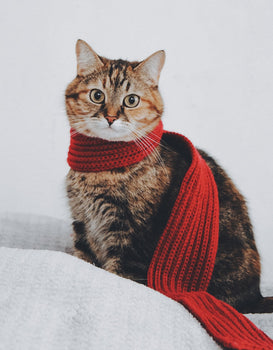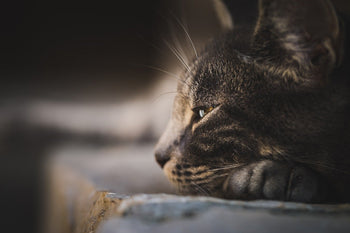
If you're a cat owner, you may have experienced your feline friend meowing loudly in the morning, sometimes even before the sun rises. While cats communicate in various ways, meowing is one of their primary vocalizations, and it can have different meanings. Understanding why your cat meows in the morning can help you manage their behavior and ensure their health and well-being.
Cats meow for various reasons, including communicating with their owners, expressing their needs, and seeking attention. In the morning, your cat may be meowing to let you know that they're hungry, bored, or want to play. However, excessive meowing in the morning can also be a sign of health or behavioral concerns, such as anxiety, stress, or illness. If your cat's morning meows are persistent and unusual, you may want to consult your veterinarian to rule out any underlying medical conditions.
Key Takeaways
- Understanding why your cat meows in the morning can help you manage their behavior and ensure their health and well-being.
- Morning meows can be a sign of hunger, boredom, or health and behavioral concerns.
- If your cat's morning meows are persistent and unusual, you may want to consult your veterinarian to rule out any underlying medical conditions.
Understanding Cat Meows
If you're a cat owner, you're probably familiar with the sound of your feline friend's meows. But have you ever wondered what they're trying to tell you? Understanding cat meows can help you identify your cat's needs and respond accordingly.
Reasons for Morning Meows
One of the most common times for cats to meow excessively is in the morning. There are a few reasons why your cat might be meowing at this time:
- Hunger: Cats are creatures of habit, and if they're used to being fed in the morning, they'll likely meow to remind you that it's time for breakfast.
- Attention-seeking: Some cats just love being the center of attention, and meowing in the morning is a way for them to get your attention and affection.
- Playtime: Cats are often most active in the morning, and if your cat is feeling playful, they might meow to try to entice you to play with them.
Decoding Different Meows
Not all meows are created equal. Cats have a whole repertoire of different meows that they use to communicate different things. Here are a few examples:
- Short, high-pitched meows: This is often a greeting or a way of saying hello.
- Long, drawn-out meows: This can be a sign of frustration or a way of expressing discontent.
- Chirping or trilling: Cats often make these sounds when they're feeling playful or excited.
By paying attention to the tone and length of your cat's meows, you can start to decode what they're trying to tell you.
Health and Behavioral Concerns
Medical Conditions Related to Meowing
Excessive meowing in the morning could be a sign of an underlying medical condition. If your cat is meowing more than usual, it is important to take note of any other symptoms that may be present. Some medical conditions that could be related to excessive meowing include:
-
Overactive thyroid: Hyperthyroidism is a common condition in older cats and can cause excessive meowing, among other symptoms. Your veterinarian can perform a blood test to diagnose this condition.
-
Pain: Cats in pain may meow excessively, especially in the morning. If you suspect your cat is in pain, it is important to take them to the veterinarian for a check-up.
- Kidney disease: Chronic kidney disease can cause excessive meowing, as well as other symptoms such as increased thirst and urination. Your veterinarian can diagnose this condition with blood and urine tests.
Behavioral Reasons Behind Excessive Meowing

In addition to medical conditions, there are also behavioral reasons why your cat may be meowing excessively in the morning. Some behavioral reasons include:
-
Anxiety: Cats that are anxious or stressed may meow excessively in the morning. This could be due to a change in routine, a new family member or pet, or a change in environment.
- Cognitive dysfunction: Older cats may meow excessively in the morning due to cognitive dysfunction, which is similar to Alzheimer's disease in humans. This condition can cause confusion and disorientation, leading to excessive meowing.
To determine the cause of your cat's excessive meowing, it is important to observe their behavior and take note of any other symptoms that may be present. If you suspect your cat may have a medical condition, take them to the veterinarian for a check-up. If the cause is behavioral, try to identify and address the underlying cause of their anxiety or stress.
Managing Morning Meows
If your cat is meowing excessively in the morning, you may be wondering how to stop this behavior. Fortunately, there are several strategies you can use to manage morning meows and create a more peaceful morning routine.
Creating a Comforting Environment

One reason cats may meow in the morning is because they are feeling anxious or stressed. To help alleviate this, make sure your cat has a comfortable and secure environment. This can include providing a cozy bed, a scratching post, and toys to play with. You may also want to consider using pheromone sprays or diffusers to create a calming atmosphere.
Establishing a Routine
Cats thrive on routine, so establishing a consistent morning routine can help reduce morning meows. This can include feeding your cat at the same time every morning, as well as providing play sessions and litter box access on a regular schedule. You may also want to consider incorporating training sessions into your morning routine to reinforce positive behaviors.
In addition to these strategies, it's important to avoid inadvertently reinforcing your cat's morning meows by giving in to their demands. Instead, try to remain calm and consistent in your response to their behavior.















